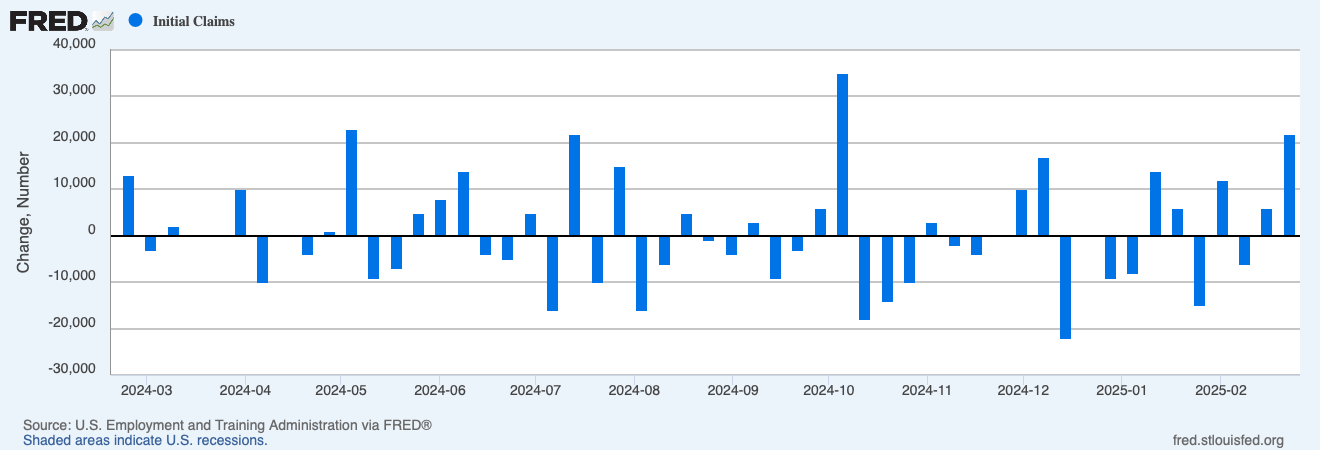What Gen Z Needs to Know About Navigating Today's Labor Market
Let's cut through the noise with the latest data and how it impacts you:
Initial jobless claims just hit 242,000 (up 22,000 from last week)
Manufacturing is taking a significant hit (Kentucky alone reported 3,012 new layoffs)
This marks the largest jump in weekly claims in five months
While some blame the weather, these numbers reflect what many of you are experiencing firsthand: the job market is cooling. Despite what your LinkedIn feed might suggest with endless "We're hiring!" posts, the reality is more complicated.
The "Great Stay" and What It Means for You
The job-hopping frenzy of 2021-2022 has evolved into what economists call the "Great Stay":
Workers are staying put in their current roles
The quit rate has fallen below pre-pandemic levels
Hiring has slowed to its lowest since 2013 (outside early pandemic)
What this means to you is that people aren't moving, companies are hiring slower, and competition for entry-level positions is intensifying. This creates a particularly challenging environment for those of you trying to break into the workforce or make early career moves.
The Uncomfortable Truth: Hiring Manager Perceptions
Here's something you should know: A recent Deloitte survey found that 94% of managers express reluctance to hire Gen Z candidates. Some reasons why hiring managers avoid Gen Z are:
20-40% of Gen Z lack essential workplace skills
Questions about Gen Z’s motivation and work ethic
Concerns about cultural fit
Is this fair? Absolutely not. Is it the reality you're facing? Unfortunately, yes. Understanding these perceptions is critical in your search and to strategically position yourself in interviews and applications.
Bridging the Perception Gap
The disconnect between how managers view Gen Z and who you actually are creates both challenges and opportunities:
Skills translation: Your digital fluency, multitasking abilities, and adaptability are genuine skills—but you need to frame them in terms employers understand.
Communication styles: Different doesn't mean deficient. However, demonstrating versatility in your communication approach can help bridge generational gaps.
Motivation misconceptions: Your generation values purpose, impact, and balance—legitimate priorities that can benefit employers when properly communicated.
Economic context awareness: You entered adulthood during unprecedented disruption. This resilience is an asset worth highlighting.
Practical Strategies for Standing Out
Given these realities, here's how to position yourself effectively:
Explicitly address the elephant in the room: In cover letters and interviews, tactfully acknowledge how you overcome generational stereotypes and provide concrete examples that counter them.
Signal effort visibly: While this shouldn't be necessary, extra follow-up, preparation, and professionalism can help overcome unconscious bias.
Document your skills development: Create a "learning journal" to track courses, certifications, and self-directed education that demonstrates your commitment to growth. My mentees will recognize this as the power of reflection.
Leverage your digital native advantages: Highlight specific ways your technological intuition and social media literacy can solve business problems.
Seek out Gen X and Mellinials as mentors: They often bridge the gap between traditional workplace expectations and newer work styles, providing valuable guidance.
Where the Opportunities Are
Despite the challenging landscape, several bright spots exist:
Startups and smaller companies often more open to non-traditional candidates
Roles requiring digital fluency and consumer insight where your perspective is invaluable
Project-based work that can build your portfolio while the full-time market stabilizes
The Bigger Picture
The labor market is a lagging economic indicator—it reflects what's already happened, not what's coming. The current slowdown doesn't define your entire career trajectory. Economic conditions fluctuate, and the skills you develop during challenging times often become your greatest strengths.
Tomorrow's unemployment report will provide more context, but your focus should remain on positioning yourself for opportunity regardless of market conditions. That means continuing to develop marketable skills, building meaningful relationships, and maintaining resilience through uncertainty.
Remember: The fact that 94% of managers express hesitation about hiring Gen Z also means that organizations willing to look past stereotypes have access to an undervalued talent pool—that's you. Your generation's unique perspective and capabilities remain valuable, even if the current market hasn't fully recognized it yet.



